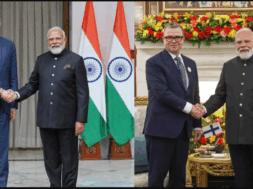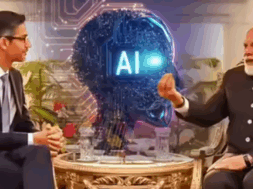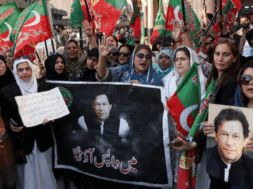
Roving Periscope: Most Indian-Americans may support Kamala Harris
Virendra Pandit
New Delhi: They were both there. The outgoing US President Joe Biden and his deputy, Vice President Kamala Harris, the Democratic nominee, celebrated the Deepawali festival in the White House on Monday, with several Indian-Americans present.
In the nail-biting November 5 presidential elections, the 2.3 million votes of the influential Indian-American community matter both for Harris and her Republican challenger Donald Trump.
The final nationwide CNN poll, held this week, found that 47 percent of likely voters support Harris and an equal 47 percent would endorse Trump in the next week’s elections, the media reported on Wednesday.
As the US presidential election heads for a photo finish, Kamala Harris, the daughter of Indian and Jamaican immigrants, has been counting on groundswell of support from the Indian-American community in most of the pivotal battleground states.
For many Indian-Americans, her race to the White House is a momentous occasion as, for the first time, it is propelling the community into a significant force in the American political discourse.
“It is a matter of pride that a leader of Indian descent is fighting the US presidential election,” said Dr. Vasudev Patel, General Secretary of the Federation of Indian-American Association, Georgia, which is among the seven key battleground states. He said the Indian-American community could play a significant role in swinging the election in Harris’s favor.
“I voted for Trump last time. But now, I will vote for Kamala Harris,” said Saurabh Gupta, a technocrat from New Delhi, who now lives in Montgomery County in Maryland.
If Harris wins the key race, then it will be the first time in US history that a candidate of Indian heritage would occupy the top office.
After she received the Democratic presidential nomination in August, various Indian-American and South Asian American groups mobilized support for her, including through raising funds.
The number of Indian-Americans in the US is nearly 5.2 million, forming the second-largest immigrant community. About 2.3 million of them are eligible to vote.
About 55 percent of Indian-American eligible voters identified as Democrats as against 26 percent as Republicans, according to a 2024 survey conducted by research organization AAPI, before President Joe Biden pulled out from the re-election bid in August on health grounds and age-related issues.
A survey this month by the Carnegie Endowment suggested that 61 percent of registered Indian-American voter respondents could vote for Harris while 32 percent intend to vote for Trump.
It said 67 percent of Indian-American women intend to vote for Harris while 53 percent of men, a significantly smaller share, say they plan to vote for her.
Twenty-two percent of women intend to vote for Trump while 39 percent of men plan to cast their ballots for him, it said.
With just seven days left for Election Day, the presidential race remained very tight with both Harris and Trump locked in a dead heat for the popular votes in most swing states.
The final nationwide CNN poll found this week that 47 percent of likely voters support Harris and an equal 47 percent would endorse Trump in the elections. The Indian-American vote may, therefore, become a tie-breaker.
In the final New York Times/Siena College national poll from October 20 to 23, the two aspirants are tied at 48 percent. The remaining four percent are yet to decide on their preference.
A separate poll conducted by the Financial Times and the University of Michigan’s Ross School of Business showed that 44 percent of respondents trust Trump to handle the economy as opposed to 43 percent for Harris.
To win the race to the White House, the successful candidate will have to secure 270 of the 538 electoral votes up for grabs.
The seven key swing states that are seen to be crucial to determining the election results are Georgia, Michigan, Arizona, Pennsylvania, North Carolina, Wisconsin, and Nevada.














